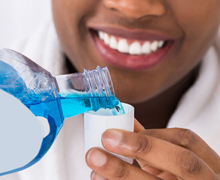
If you belong to a gym that supplies mouthwash in the locker room and someone tells you to avoid it, your first thought might be there is a chance you would be picking up someone else’s bacteria. But in reality you would be killing your own bacteria and nullifying some of the work you just did during your workout.
It has long been known exercise can reduce blood pressure but researchers at the University of Plymouth (England) have discovered using antibacterial mouthwash after working out cuts that blood pressure reduction by as much as 60 percent. That’s because mouthwash kills bacteria in your mouth beneficial in the body’s use of nitric oxide.
Lead author of the report published in the journal Free Radical Biology and Medicine Dr. Raul Bescos said, "Scientists already know that blood vessels open up during exercise, as the production of nitric oxide increases the diameter of the blood vessels, increasing blood flow circulation to active muscles. What has remained a mystery is how blood circulation remains higher after exercise, in turn triggering a blood-pressure lowering response known as post-exercise hypotension.”
Previous research led scientists to believe nitric oxide was only involved during the act of exercising and not involved in the post-exercise dilation of blood vessels. But Bescos believes this research sheds new light on what actually happens after the workout is complete.
"It's all to do with nitric oxide degrading into a compound called nitrate, which for years was thought to have no function in the body,” Bescos said. “But research over the last decade has shown that nitrate can be absorbed in the salivary glands and excreted with saliva in the mouth.
"Some species of bacteria in the mouth can use nitrate and convert into nitrite—a very important molecule that can enhance the production of nitric oxide in the body,” Bescos added. “And when nitrite in saliva is swallowed, part of this molecule is rapidly absorbed into the circulation and reduced back to nitric oxide. This helps to maintain a widening of blood vessels which leads to a sustained lowering of blood pressure after exercise.”
Researchers wanted to see if by blocking the oral bacteria that converts nitrate to nitrite it would have an effect on post-exercise blood pressure levels. They found study participants who rinsed their mouths with a placebo after 30 minutes on the treadmill had an average reduction in systolic blood pressure of -5.2 mmHg one hour after exercise. But those who rinsed with an antibacterial mouthwash had a reduction of only -2.0 mmHg at the same time point. All reduction stopped by the two-hour mark for those in the mouthwash group but it continued for the others.
Study co-author Craig Cutler said, "These findings show that nitrite synthesis by oral bacteria is hugely important in kick-starting how our bodies react to exercise over the first period of recovery, promoting lower blood pressure and greater muscle oxygenation. In effect, it's like oral bacteria are the 'key' to opening up the blood vessels. If they are removed, nitrite can't be produced and the vessels remain in their current state. Long-term, research in this area may improve our knowledge for treating hypertension—or high blood pressure—more efficiently."
Click here to read more in the journal Free Radical Biology and Medicine.
